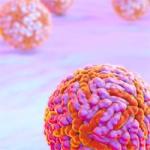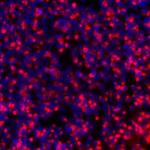
Research Topics
The research focuses on understanding how cancer spreads and how it develops its own blood supply. The work aims not only to understand these fundamental processes of cancer progression but also to develop novel therapies that target a tumor's ability to grow blood vessels and spread to distant sites. One of the research program's main aims is to detail the earliest microenvironmental events in the metastatic cascade and translate these findings into the clinical setting. This work led to the development of a novel paradigm demonstrating that even localized tumors have systemic effects to prepare distant tissue sites for metastases. This is based on our discoveries that bone marrow-derived cells are recruited to future sites of metastasis and establish a receptive microenvironment for incoming circulating tumor cells, termed the 'pre-metastatic niche'. We have determined that these specialized bone marrow-derived cells are present in the circulation as well as in metastatic tissue of patients with pediatric and adult cancers. These cells may serve not only as useful biomarkers for metastatic propensity, but also as fundamental mediators of the metastatic process and therefore a potential useful target for the prevention of metastatic spread. The role of these bone marrow-derived cells in tumor progression, neo-angiogenesis and promoting immune evasion, and the specific regulation of gene expression in the pre-metastatic niche are current areas of focus.
The laboratory is focused on translation of these preclinical findings into the development of clinical studies aimed at targeting the tumor microenvironment. Performing gene expression profiling of the cells in the tumor microenvironment in patient samples can support a personalized approach to treatment of how that tumor impacts its host. We are currently performing several correlational studies to determine the timing of mobilization of the bone marrow-derived cells, changes that occur with chemotherapy, radiation and surgery as well as differences in these cells in circulation and specific tissue sites. These studies will hopefully lay the ground work for design of targeted therapies to be administered at specific time points to thwart the critical interaction of a tumor and its microenvironment.
Biography
Dr. Kaplan received her medical degree from Dartmouth Medical School. She completed her pediatric residency training at Harvard Children's Hospital Boston and Boston Medical Center. Following residency Dr. Kaplan pursued a fellowship in Pediatric Hematology and Oncology at Memorial Sloan-Kettering Cancer Center and Weill Cornell Medical Center, where she served as Chief Fellow. She did her postdoctoral research work in the laboratory of Dr. David Lyden. She was appointed Assistant Professor at Weill Cornell Medical College and Assistant Member at Memorial Sloan Kettering Cancer Center in 2006. In the fall of 2010 she joined the Pediatric Oncology Branch of the NCI. She is a clinician and physician scientist with active translational and clinical research interests focused on the mechanism of cancer spread. Dr. Kaplan has been the recipient of several grants including the Charles, Lillian and Betty Neuwirth Clinical Scholar in Pediatric Oncology, Doris Duke Charitable Career Development Award, a co-investigator in the Komen Foundation Investigator-Initiated Award, Hope Street Kids grant award, ASCO young investigator award, and the Association for Research of Childhood Cancer.
Selected Publications
- Peinado H, Zhang H, Matei IR, Costa-Silva B, Hoshino A, Rodrigues G, Psaila B, Kaplan RN, Bromberg JF, Kang Y, Bissell MJ, Cox TR, Giaccia AJ, Erler JT, Hiratsuka S, Ghajar CM, Lyden D. Pre-metastatic niches: organ-specific homes for metastases. Nat Rev Cancer. 2017;17(5):302-317.
- Giles AJ, Reid CM, Evans JD, Murgai M, Vicioso Y, Highfill SL, Kasai M, Vahdat L, Mackall CL, Lyden D, Wexler L, Kaplan RN. Activation of Hematopoietic Stem/Progenitor Cells Promotes Immunosuppression Within the Pre-metastatic Niche. Cancer Res. 2016;76(6):1335-47.
- Giles AJ, Chien CD, Reid CM, Fry TJ, Park DM, Kaplan RN, Gilbert MR. The functional interplay between systemic cancer and the hematopoietic stem cell niche. Pharmacol Ther. 2016;168:53-60.
- Highfill SL, Cui Y, Giles AJ, Smith JP, Zhang H, Morse E, Kaplan RN, Mackall CL. Disruption of CXCR2-mediated MDSC tumor trafficking enhances anti-PD1 efficacy. Sci Transl Med. 2014;6(237):237ra67.
- Peinado H, Alečković M, Lavotshkin S, Matei I, Costa-Silva B, Moreno-Bueno G, Hergueta-Redondo M, Williams C, García-Santos G, Ghajar C, Nitadori-Hoshino A, Hoffman C, Badal K, Garcia BA, Callahan MK, Yuan J, Martins VR, Skog J, Kaplan RN, Brady MS, Wolchok JD, Chapman PB, Kang Y, Bromberg J, Lyden D. Melanoma exosomes educate bone marrow progenitor cells toward a pro-metastatic phenotype through MET. Nat Med. 2012;18(6):883-91.
Related Scientific Focus Areas
This page was last updated on Thursday, April 18, 2024




